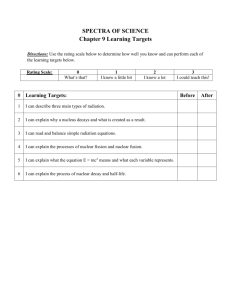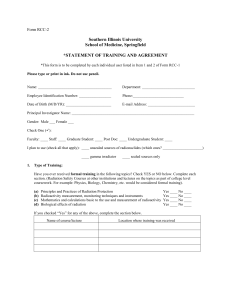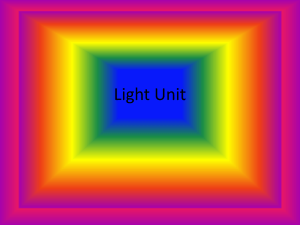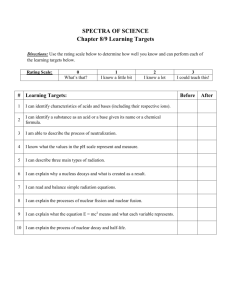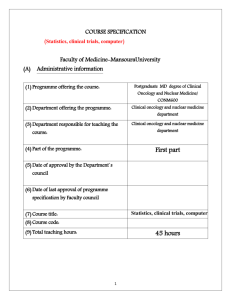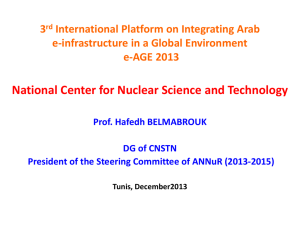Goals and Objectives for Diagnostic Radiology Residency Rotations
advertisement
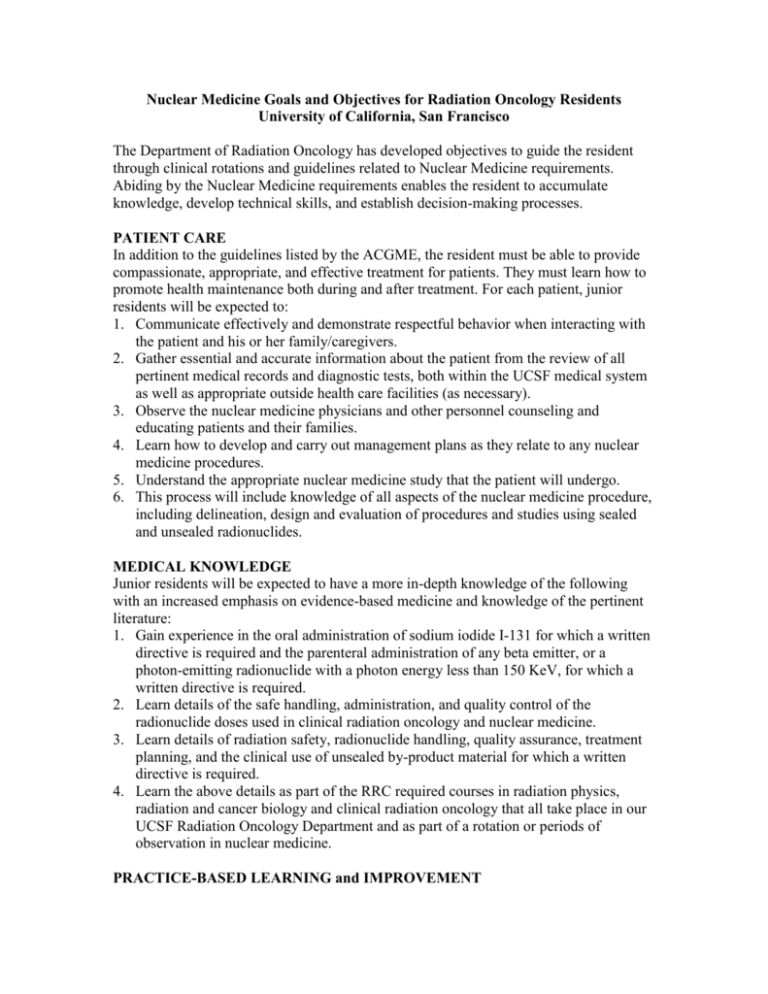
Nuclear Medicine Goals and Objectives for Radiation Oncology Residents University of California, San Francisco The Department of Radiation Oncology has developed objectives to guide the resident through clinical rotations and guidelines related to Nuclear Medicine requirements. Abiding by the Nuclear Medicine requirements enables the resident to accumulate knowledge, develop technical skills, and establish decision-making processes. PATIENT CARE In addition to the guidelines listed by the ACGME, the resident must be able to provide compassionate, appropriate, and effective treatment for patients. They must learn how to promote health maintenance both during and after treatment. For each patient, junior residents will be expected to: 1. Communicate effectively and demonstrate respectful behavior when interacting with the patient and his or her family/caregivers. 2. Gather essential and accurate information about the patient from the review of all pertinent medical records and diagnostic tests, both within the UCSF medical system as well as appropriate outside health care facilities (as necessary). 3. Observe the nuclear medicine physicians and other personnel counseling and educating patients and their families. 4. Learn how to develop and carry out management plans as they relate to any nuclear medicine procedures. 5. Understand the appropriate nuclear medicine study that the patient will undergo. 6. This process will include knowledge of all aspects of the nuclear medicine procedure, including delineation, design and evaluation of procedures and studies using sealed and unsealed radionuclides. MEDICAL KNOWLEDGE Junior residents will be expected to have a more in-depth knowledge of the following with an increased emphasis on evidence-based medicine and knowledge of the pertinent literature: 1. Gain experience in the oral administration of sodium iodide I-131 for which a written directive is required and the parenteral administration of any beta emitter, or a photon-emitting radionuclide with a photon energy less than 150 KeV, for which a written directive is required. 2. Learn details of the safe handling, administration, and quality control of the radionuclide doses used in clinical radiation oncology and nuclear medicine. 3. Learn details of radiation safety, radionuclide handling, quality assurance, treatment planning, and the clinical use of unsealed by-product material for which a written directive is required. 4. Learn the above details as part of the RRC required courses in radiation physics, radiation and cancer biology and clinical radiation oncology that all take place in our UCSF Radiation Oncology Department and as part of a rotation or periods of observation in nuclear medicine. PRACTICE-BASED LEARNING and IMPROVEMENT Residents must demonstrate the ability to use information technology and feedback to improve their fund of knowledge and skills. The expectation is that they learn how search, review, and analyze medical information in PubMed as well as the UCSF Medical Library. INTERPERSONAL and COMMUNICATION SKILLS All residents are expected to: 1. Communicate with patient and their family/caregivers in an easily understood and culturally sensitive manner. 2. Communicate effectively with medical and support staff, demonstrating respect and maintaining professional relationships with all members of the radiation oncology and nuclear medicine team. 3. Communicate with other physicians and health care professionals. 4. Work effectively as a team member, progressively accepting more responsibility and participate in a leadership role as progressing through the residency. 5. Maintain comprehensive, accurate and timely medical records. All relevant medical records must be completed within 48 hours of the patient visit. PROFESSIONALISM All residents are expected to: 1. Demonstrate compassion, respect, and integrity and responsiveness to patient's needs. 2. Be accountable to their patients and their profession. 3. Demonstrate a commitment to excellence and on-going professional development. 4. Function well as a member of the team. 5. Practice in an ethical manner with regard to provision or withholding of care, confidentiality of PHI, and informed consent. 6. Maintain comprehensive, accurate, and timely medical records. SYSTEM-BASED PRACTICE Residents will demonstrate an awareness of and responsiveness to the health care system and ability to call on resources to provide care. They are expected to: 1. Understand how their professional patient care practices affect other health care professionals, the healthcare organization and the community. 2. Practice cost-effective health care that does not compromise quality of care. 3. Advocate for quality patient care practices and help patients navigate through complexities in the healthcare system. LIST OF SPECIFIC EXPECTATIONS The following is a list of specific expectations for resident physicians in training at UCSF while assigned to the Nuclear Medicine Service. The goal of the list is to facilitate learning, improve patient management skills, and to improve knowledge of relevant literature and its application to the individual patient. 1. Attend relevant Nuclear Medicine conferences including daily “sign out” of all studies read out that day by the Nuclear Medicine team. 2. Gain experience in the oral administration of sodium iodide I-131 for which a written directive is required and the parenteral administration of any beta emitter, or a 3. 4. 5. 6. 7. photon-emitting radionuclide with a photon energy less than 150 KeV, for which a written directive is required. Learn the safe handling, administration, and quality control of the radionuclide doses used in clinical radiation oncology and nuclear medicine. Learn details of radiation safety, radionuclide handling, quality assurance, treatment planning, and the clinical use of unsealed byproduct material for which a written directive is required. Gain understanding of the procedures for instruments used to determine the activity of radiopharmaceuticals for human administration and procedures used to perform checks for proper operation of survey meters. Participate in the administration of no fewer than six procedures using radioimmunotherapy, other targeted therapeutic radiopharmaceuticals, or unsealed radioactive sources. Gain experience in reading standard nuclear medicine studies including bone scan and FDG-Positron emission tomography (PET).
